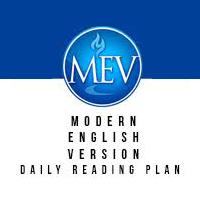Ezra 1–2
1 Now in the first year of Cyrus king of Persia, that the word of the Lord by the mouth of Jeremiah might be fulfilled, the Lord stirred up the spirit of Cyrus king of Persia, so that he issued a proclamation throughout all his kingdom, and also put it in writing, saying,
2 “Thus says Cyrus king of Persia:
“The Lord God of heaven has given me all the kingdoms of the earth, and He has charged me to build Him a house at Jerusalem, which is in Judah. 3 Whoever there is among you of all His people, may his God be with him, and may he go to Jerusalem, which is in Judah, and build the house of the Lord God of Israel. He is the God who is in Jerusalem. 4 Whoever remains in any place where he sojourns, let the men of his place help him with silver, gold, goods, and animals, along with voluntary gifts for the house of God in Jerusalem.”
5 Then the heads of the households of Judah and Benjamin, and the Levitical priests, with all those whose spirits God had stirred, rose up to go up to build the house of the Lord in Jerusalem. 6 So everyone all around them strengthened their hands with vessels of silver, gold, goods, animals, and precious things, besides all that was given voluntarily. 7 Also Cyrus the king brought forth the vessels of the house of the Lord, which Nebuchadnezzar had brought from Jerusalem and had put in the house of his gods. 8 Cyrus king of Persia even brought forth more for them, by the hand of Mithredath the treasurer and had them numbered for Sheshbazzar, who was the prince of Judah.
9 This is the number of them: thirty containers of gold, one thousand containers of silver, and twenty-nine knives. 10 There were also thirty smaller bowls of gold, four hundred and ten smaller bowls of silver (of lesser value), and one thousand other various containers.
11 All the articles of gold and silver were five thousand four hundred. All these did Sheshbazzar bring up, when the exiles were brought from Babylon to Jerusalem.
Chapter 2
1 Now these are the people of the province who went up from the captivity of the exiles, whom Nebuchadnezzar the king of Babylon had carried away to Babylon, and came again to Jerusalem and Judah. Each returned to his own city. 2 Those who came with Zerubbabel were Joshua, Nehemiah, Seraiah, Reelaiah, Mordecai, Bilshan, Mispar, Bigvai, Rehum, and Baanah.
The number of men of the people of Israel were:
3 The sons of Parosh—two thousand one hundred and seventy-two;
4 the sons of Shephatiah—three hundred and seventy-two;
5 the sons of Arah—seven hundred and seventy-five;
6 the sons of Pahath-Moab of the sons of Jeshua and Joab—two thousand eight hundred and twelve;
7 the sons of Elam—one thousand two hundred and fifty-four;
8 the sons of Zattu—nine hundred and forty-five;
9 the sons of Zakkai—seven hundred and sixty;
10 the sons of Bani—six hundred and forty-two;
11 the sons of Bebai—six hundred and twenty-three;
12 the sons of Azgad—one thousand two hundred and twenty-two;
13 the sons of Adonikam—six hundred and sixty-six;
14 the sons of Bigvai—two thousand and fifty-six;
15 the sons of Adin—four hundred and fifty-four;
16 the sons of Ater of Hezekiah—ninety-eight;
17 the sons of Bezai—three hundred and twenty-three;
18 the sons of Jorah—one hundred and twelve;
19 the sons of Hashum—two hundred and twenty-three;
20 the sons of Gibbar—ninety-five.
21 The sons of Bethlehem—one hundred and twenty-three;
22 the men of Netophah—fifty-six;
23 the men of Anathoth—one hundred and twenty-eight;
24 the sons of Azmaveth—forty-two;
25 the sons of Kiriath Arim, Kephirah, and Beeroth—seven hundred and forty-three;
26 the sons of Ramah and Geba—six hundred and twenty-one;
27 the men of Mikmash—one hundred and twenty-two;
28 the men of Bethel and Ai—two hundred and twenty-three;
29 the sons of Nebo—fifty-two;
30 the sons of Magbish—one hundred and fifty-six;
31 the sons of the other Elam—one thousand two hundred and fifty-four;
32 the sons of Harim—three hundred and twenty;
33 the sons of Lod, Hadid, and Ono—seven hundred and twenty-five;
34 the sons of Jericho—three hundred and forty-five;
35 the sons of Senaah—three thousand six hundred and thirty.
36 Those who came with the priests were:
the sons of Jedaiah, of the house of Jeshua—nine hundred and seventy-three;
37 the sons of Immer—one thousand and fifty-two;
38 the sons of Pashhur—one thousand two hundred and forty-seven;
39 the sons of Harim—one thousand and seventeen.
40 Those who came with the Levites were:
the sons of Jeshua and Kadmiel, of the sons of Hodaviah—seventy-four.
41 Those who came with the singers were:
the sons of Asaph—one hundred and twenty-eight.
42 The sons of the gatekeepers were:
the sons of Shallum, the sons of Ater, the sons of Talmon, the sons of Akkub, the sons of Hatita, the sons of Shobai—in all one hundred and thirty-nine.
43 Those devoted to the temple as servants were:
the sons of Ziha, the sons of Hasupha, the sons of Tabbaoth,
44 the sons of Keros, the sons of Siaha, the sons of Padon,
45 the sons of Lebanah, the sons of Hagabah, the sons of Akkub,
46 the sons of Hagab, the sons of Shalmai, the sons of Hanan,
47 the sons of Giddel, the sons of Gahar, the sons of Reaiah,
48 the sons of Rezin, the sons of Nekoda, the sons of Gazzam,
49 the sons of Uzza, the sons of Paseah, the sons of Besai,
50 the sons of Asnah, the sons of Meunim, the sons of Nephusim,
51 the sons of Bakbuk, the sons of Hakupha, the sons of Harhur,
52 the sons of Bazluth, the sons of Mehida, the sons of Harsha,
53 the sons of Barkos, the sons of Sisera, the sons of Temah,
54 the sons of Neziah, the sons of Hatipha.
55 The sons of Solomon’s servants were:
the sons of Sotai, the sons of Hassophereth, the sons of Peruda,
56 the sons of Jaala, the sons of Darkon, the sons of Giddel,
57 the sons of Shephatiah, the sons of Hattil, the sons of Pokereth-Hazzebaim, the sons of Ami.
58 All those devoted to the temple as servants and the children of Solomon’s servants were three hundred and ninety-two.
59 These were the ones who came up from Tel Melah, Tel Harsha, Kerub, Addon, and Immer; but they could not prove their father’s house or their descent, whether they were of Israel:
60 the sons of Delaiah, the sons of Tobiah, and the sons of Nekoda—six hundred and fifty-two;
61 and of the sons of the priests:
the sons of Hobaiah, the sons of Hakkoz, and the sons of Barzillai (whose ancestor married one of the daughters of Barzillai the Gileadite and was thereafter called by their name).
62 These sought their records in the genealogy register, but they were not found. Therefore, they were disqualified (as polluted) from the priesthood. 63 The governor advised them not to eat of the most holy things until a priest consulted with the Urim and Thummim.
64 The whole congregation together was forty-two thousand three hundred and sixty, 65 besides their male and female servants (these numbered seven thousand three hundred and thirty-seven); they also had two hundred singing men and women. 66 Their horses numbered seven hundred and thirty-six; their mules, two hundred and forty-five; 67 their camels, four hundred and thirty-five; and their donkeys, six thousand seven hundred and twenty.
68 As some of the heads of households came to the house of the Lord in Jerusalem, they volunteered to erect the foundations for the house of God. 69 They gave after their ability to the treasure of the work sixty-one thousand drachmas of gold, five thousand pounds of silver, and one hundred priestly garments.
70 So the priests and the Levites, along with some of the people, the singers, the porters, and those donated as temple servants, lived in their cities, with the result that all Israel resettled in their cities.
John 19:23–42
23 When the soldiers had crucified Jesus, they took His garments and divided them into four parts, a part for each soldier; and also His tunic. Now the tunic was seamless, woven from top to bottom.
24 So they said to one another, “Let us not tear it, but cast lots for it to decide whose it shall be.”
This happened to fulfill the Scripture which says:
“They divided My garments among them,
and for My clothing they cast lots.”
Therefore the soldiers did these things.
25 But standing by the cross of Jesus were His mother, and His mother’s sister, Mary the wife of Clopas, and Mary Magdalene. 26 When Jesus saw His mother and the disciple whom He loved standing nearby, He said to His mother, “Woman, here is your son.” 27 Then He said to the disciple, “Here is your mother.” From that time, this disciple took her to his own home.
28 After this, Jesus, knowing that everything was now accomplished, that the Scripture might be fulfilled, said, “I thirst.” 29 A bowl full of sour wine was placed there. So they put a sponge full of sour wine on hyssop and held it to His mouth. 30 When Jesus had received the sour wine, He said, “It is finished.” And He bowed His head and gave up His spirit.
31 Since it was the Day of Preparation, to prevent bodies from remaining on the cross on the Sabbath day (for that Sabbath day was a high day), the Jews asked Pilate that their legs might be broken, and that they might be taken away. 32 Therefore the soldiers came and broke the legs of the first and of the other who was crucified with Him. 33 But when they came to Jesus and saw that He was dead already, they did not break His legs. 34 However, one of the soldiers pierced His side with a spear, and immediately blood and water came out. 35 He who saw it has testified, and his testimony is true. He knows that he is telling the truth, that you may believe. 36 For these things happened so that the Scripture should be fulfilled, “Not one of His bones shall be broken,” 37 and again another Scripture says, “They shall look on Him whom they have pierced.”
38 After this, Joseph of Arimathea, being a disciple of Jesus, but secretly for fear of the Jews, asked Pilate that he might take away the body of Jesus. Pilate gave him permission. So he came and took away His body. 39 Nicodemus, who at first came to Jesus by night, also came, bringing a mixture of myrrh and aloes, weighing about seventy-five pounds. 40 Then they took the body of Jesus and wrapped it in linen cloths with the spices, as is the burial custom of the Jews. 41 Now in the place where He was crucified there was a garden, and in the garden was a new tomb in which no one had ever been buried. 42 So because of the Jewish Day of Preparation, and since the tomb was nearby, they buried Jesus there.

